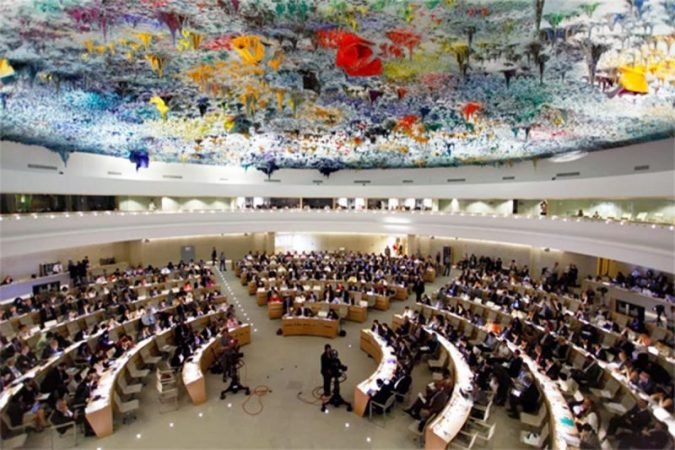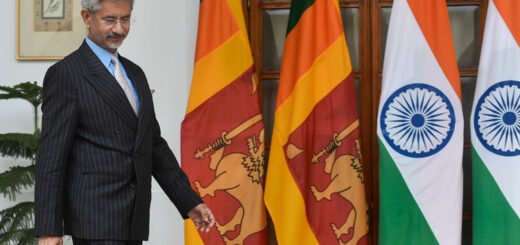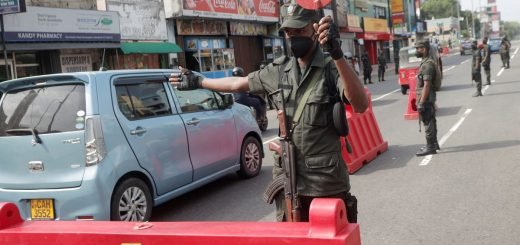Supporting the UNHRC 46th Session, Lankan Tamils carries Pottuvil to Poligandy rally in Sri Lanka

After months of pandemic restrictions, Sri Lanka saw its first instance of people asserting their rights on streets – the five days long march, Pottuvil to Poligandy rally (P to P) was held from 3 to 7 February 2021 across Sri Lanka’s eastern Ampara district and northern Jaffna provinces.
The ‘P to P’ march came after the Lankan government rejected the report claim stated by Michelle Bachelet, the U.N. Human Rights High Commissioner asserting the failure of Lankan government to address the past human rights violation conducted during the Sri Lankan Civil War (1983-2009) between government and separatist LTTE forces. Further, stating that no genuine progress has been made to end impunity through a domestic transitional process, she stressed concerns over the recent withdrawal of the Rajapaksa’s government from Resolution 30/1 and 40/1 via which Sri Lanka in 2015 pledged to investigate alleged war abuses through local courts and provide reparations. Commissioner Bachelet also criticized Sri Lanka’s administration for lack of governmental accountability, robust militarization, and securitization in the country, shrinking space for dissent and the abuses under Prevention of Terrorism Act (PTA) and International Covenant on Civil and Political Rights (ICCPR) Act, thus not only delaying access to justice but also setting the stage for recurrences of human rights abuses today and, in the future, she added.
Hence, UN Commissioner called upon member states to vote in the upcoming 46th Session of UN Human Rights Council (22nd February – 19th March) for referring Sri Lanka to the International Criminal Court (ICC) and investigate and persecute violations of international law under the “universal jurisdiction.” In the session, Commissioner Bachelet will be submitting a comprehensive report on Sri Lanka’s performance in implementing Resolution 30/1. The Vote Resolution recommendation to UNHRC urging for international action stemmed from the joint demand asserted by a united front of Sri Lanka’s Tamil Political Parties.
Although the long march was meant to whip support for the Lankan Tamils at the upcoming 46th session in UNHRC and was primarily carried out by Sri Lankan Tamils highlighting their long-standing grievances of civilian atrocities during the 26-year long civil war and against the supremacist policies of Rajapaksa government to counter Sinhala-Buddhist majoritarian dominance in the country, the rally saw a more inclusive turn this time.

For the first time, Sri Lankan Tamils also raised concerns of Malaiyaha (Hill Country) Tamils working in the tea estates for ensuring them their fair labour wage and the Muslim Community, to reverse the government’s mandate of forced cremation of COVID deaths as their religion enjoins them to bury. This sole mandate has flagged concerns in the international community as it sets to ignore the WHO guidelines which permit both cremation and burial, certainly signifying Lankan government’s action to marginalize minorities and carry out discriminatory practices to uphold Sinhalese-Buddhist majoritarianism. The large inclusive turnout and social media coverage with photos of people marching wearing black headbands saying #P2P reflects the mutual antagonistic Tamil-speaking communities of Sri Lanka against Rajapaksa administration.
Sri Lanka’s Tamil Political Parties submitted a joint letter to UNHRC stating majorly three demands. First, the reference to ICC for War Crimes, Crimes against Humanity and Genocide. Second, a guarantee that previous atrocities of Genocides against Tamils allegedly carried out by government military is not repeated. Third, reaching to a permanent political solution via international conduct and the demand for a monitored referendum among the Tamils of Sri Lanka.
It should be noted that India has played a prominent role in the Sri Lankan Civil War. The ethnic tension between the Sinhalese and Tamil citizens in Sri Lanka generated separatism issues in the Indian state Tamil Nadu and exerted the potential immigration of refugees from Sri Lanka to Indian shore compelling India to intervene in Lanka’s Civil War in 1987 under the leadership of Rajiv Gandhi. Since then, the Indo-Sri Lankan ties have emerged as in new dynamics. In previously held UN Meeting of 2014 which aimed to Vote on a Resolution seeking an Enquiry by the International Community into the war crimes committed by the Lankan and LTTE forces during the civil war, India “abstained from voting” signifying India’s weak stance on human rights violation and a bit inclination to secure Indo-Lankan ties in near future.
To this C.V. Wigneswaran, the Chief Minister of Tamil majority Northern Province, said “it is high time India identifies Tamils of North-East Sri Lanka as their dependable friends and change their present political stance”, further adding “if the southern block of India is to be safe, India must ensure self-determination for Tamils in North-East Sri Lanka.” He further emphasized that the recent cancellation of ECT agreement and leasing out of Jaffna islands to Chinese firms for Hybrid Energy Project under Rajapaksa government must alert India that the same can happen to Amendment 13 signed under Indo-Sri Lanka Peace Accord 1987 which granted provincials powers to Tamil communities, leading to the era of Unitary State, and disrupting the ethnic conflict even more, whose impact will be felt by India as well.
Hence, India’s vote in the upcoming 46th UNHRC sessions deems to be essential, anymore of a neutral stance may trigger up issues in Tamil Nadu, whereas it may also dilute India’s credibility to become a major power in its fight for becoming a permanent member in UNSC as in contemporary time Human Rights emerges to be a core issue in handling peace and international stability.


















